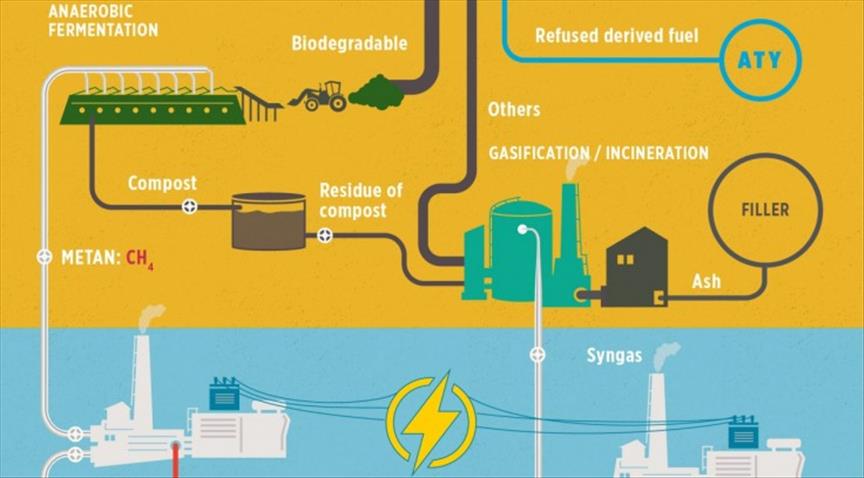By 2020 up to 3 percent of Turkey’s electricity needs can be met by using correct waste disposal techniques, Ali Kantur, chairman of Invest Trading & Consulting AG (ITC), told Anadolu Agency on Monday.
The benefits of treating waste properly while also turning it into energy include; lowering carbon emissions caused by the release of methane gas from untreated waste, reducing the use of land for waste burial, improving the surrounding areas of disposal facilities and substituting gas imports with local electricity generation, Kantur said.
The company uses a biomethanization process, suitable for moist and organic based waste found in Turkey, to produce energy.
Biomethanization is a zero-energy technique which produces energy and contributes to decreasing the production of greenhouse gases.
The biomethanization process begins with feeding the organic waste into the anaerobic digesters, which work to turn the waste into gas over 20-day period approximately. Bacteria which live at 55 degrees Celsius consume the waste during the anaerobic digestion process and turn it into gas which is then generated into electricity.
After the biomethanization process, a small amount of ash is left from the original waste.
Kantur, who manages waste disposal centers in nine cities in Turkey through ITC, revealed that they plan to expand their operations within the country.
Like any new business, ITC sought examples abroad to see what would best fit Turkey's waste disposal needs when they started 10 years ago, Kantur said.
“What we saw when we looked abroad was that no method fits Turkey’s situation because the content is different,” he said, and added that rubbish in Turkey is more moist and organic based, meaning it consists of more food and plants.
“When we first entered this business, we wanted to organize dump sites and extract gas from waste to avoid explosions,” he explained.
After gaining some experience, Kantur said that their main focus shifted to decreasing the amount of waste which has to be buried in order to extend the lifetime of landfills and eventually eliminate the need for landfills altogether, Kantur said.
With their new perspective in waste management, ITC realized the need to develop their own technology to combat disposal of waste, which Kantur describes as one of the biggest global problems.
We attended conferences and exhibitions to observe the available technology and designed and adapted technology to best suit Turkey, Kantur explained
“We are the only facility in Turkey that uses technology aimed at fully eliminating waste instead of burying it all underground,” he added.
ITC also designs, develops and produces the machinery to complete the biomethanization process, he said.
In Turkey about one million square meters of land is used to store waste every year. However, by reducing the volume of waste down to 10 percent of its original size, it is possible to cut ill-spent land to 100,000 square meters, Kantur said.
He added that the ash created after the waste treatment process can be covered with soil so the 100,000 square meters of land can be used safely.
ITC’s two facilities in the capital Ankara currently manage to reduce waste by 60-70 percent, and the company targets reaching 100 percent efficiency by 2020.
“It is possible to reach 100 percent in most of our other facilities around the country as well,” Kantur said.
The company's operations also focus on rehabilitating wild landfills, gasification, incineration, recycling and disposal of hazardous and medical wastes, he added.
By Zeynep Beyza Kilic and Ebru Sengul
Anadolu Agency
zeynep.karabay@aa.com.tr


